constituent assembly of india debates (proceedings)- volume vii
constituent assembly of india debates (proceedings)- volume vii
constituent assembly of india debates (proceedings)- volume vii
You also want an ePaper? Increase the reach of your titles
YUMPU automatically turns print PDFs into web optimized ePapers that Google loves.
In the U.S.A. this dual polity is followed by a dual citizenship. In the U.S.A. there is a citizenship <strong>of</strong> the<br />
U.S.A. But there is also a citizenship <strong>of</strong> the State. No doubt the rigours <strong>of</strong> this double citizenship are<br />
much assuaged by the fourteenth amendment to the Constitution <strong>of</strong> the United States which prohibits<br />
the States from taking away the rights, privileges and immunities <strong>of</strong> the citizen <strong>of</strong> the United States. At<br />
the same time, as pointed out by Mr. William Anderson, in certain political matters, including the right to<br />
vote and to hold public <strong>of</strong>fice, States may and do discriminate in favour <strong>of</strong> their own citizens. This<br />
favoritism goes even farther in many cases. Thus to obtain employment in the service <strong>of</strong> a State or local<br />
Government one is in most places required to the be a local resident or citizen. Similarly in the licensing<br />
<strong>of</strong> persons for the practice <strong>of</strong> such public pr<strong>of</strong>essions as law and medicine, residence or citizenship in the<br />
State is frequently required; and in business where public regulation must necessarily be strict, as in the<br />
sale <strong>of</strong> liquor, and <strong>of</strong> stocks and bonds, similar requirements have been upheld.<br />
Each State has also certain rights in its own domain that it holds for the special advantage <strong>of</strong> its own<br />
citizens. Thus wild game and fish in a sense belong to the State. It is customary for the States to charge<br />
higher hunting and fishing license fees to non-residents than to its own citizens. The States also charge<br />
non-residents higher tuition in State Colleges and Universities, and permit only residents to be admitted<br />
to their hospitals and asylums except in emergencies.<br />
In short, there are a number <strong>of</strong> rights that a State can grant to its own citizens or residents that it<br />
may and does legally deny to non-residents, or grant to non-residents only on more difficult terms than<br />
those imposed on residents. These advantages, given to the citizen in his own State, constitute the<br />
special rights <strong>of</strong> State citizenship. Taken all together, they amount to a considerable difference in rights<br />
between citizens and non-citizens <strong>of</strong> the State. The transient and the temporary sojourner is everywhere<br />
under some special handicaps.<br />
The proposed Indian Constitution is a dual polity with a single citizenship. There is only one<br />
citizenship for the whole <strong>of</strong> India. It is Indian citizenship. There is no State citizenship. Every Indian has<br />
the same rights <strong>of</strong> citizenship, no matter in what State he resides.<br />
The dual polity <strong>of</strong> the proposed Indian Constitution differs from the dual polity <strong>of</strong> the U.S.A. in<br />
another respect. In the U.S.A. the Constitutions <strong>of</strong> the Federal and the States Governments are loosely<br />
connected. In describing the relationship between the Federal and State Government in the U.S.A., Bryce<br />
has said:<br />
"The Central or national Government and the State Governments may be compared to a large building and a set <strong>of</strong> smaller buildings<br />
standing on the same ground, yet distinct from each other."<br />
Distinct they are, but how distinct are the State Governments in the U.S.A. from the Federal<br />
Government? Some idea <strong>of</strong> this distinctness may be obtained from the following facts:<br />
1. Subject to the maintenance <strong>of</strong> the republican form <strong>of</strong> Government, each State in America is free to make its own Constitution.<br />
2. The people <strong>of</strong> a State retain for ever in their hands, altogether independent <strong>of</strong> the National Government, the power <strong>of</strong> altering their<br />
Constitution.<br />
To put it again in the words <strong>of</strong> Bryce:<br />
"A State (in America) exists as a commonwealth by virtue <strong>of</strong> its own Constitution, and all State Authorities, legislative, executive and<br />
judicial are the creatures <strong>of</strong>, and subject to the Constitution."<br />
This is not true <strong>of</strong> the proposed Indian Constitution. No States (at any rate those in Part I) have a<br />
right to frame its own Constitution. The Constitution <strong>of</strong> the Union and <strong>of</strong> the States is a single frame from


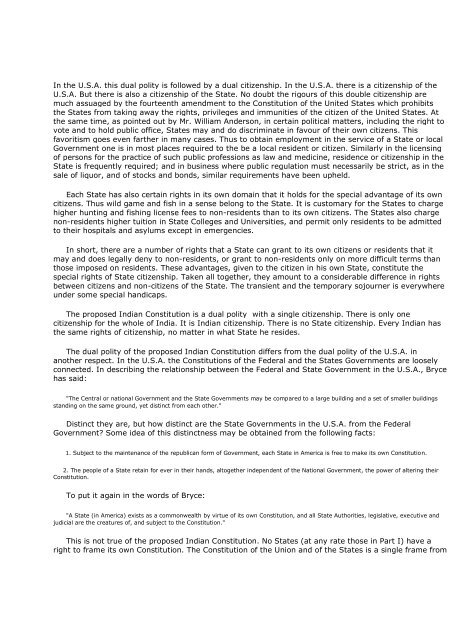
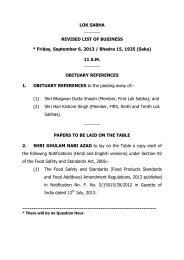
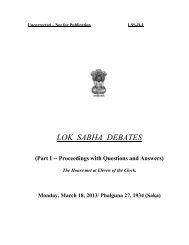
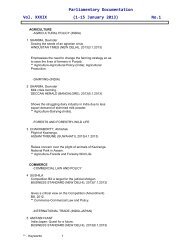
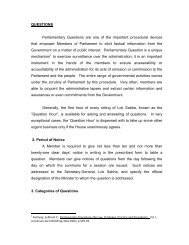
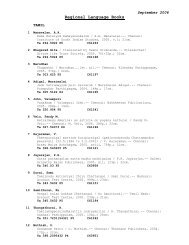
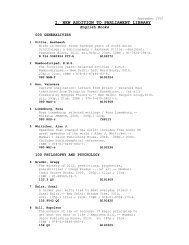
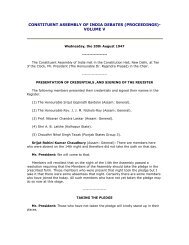
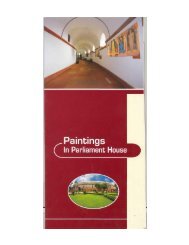
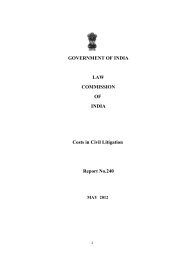
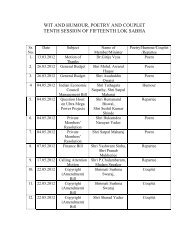
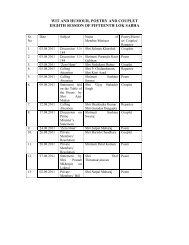

![gÉÉŌ A.]ÉŌ. xÉÉxÉÉ](https://img.yumpu.com/8015720/1/190x245/geeo-aeo-xeexee.jpg?quality=85)
